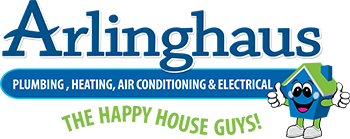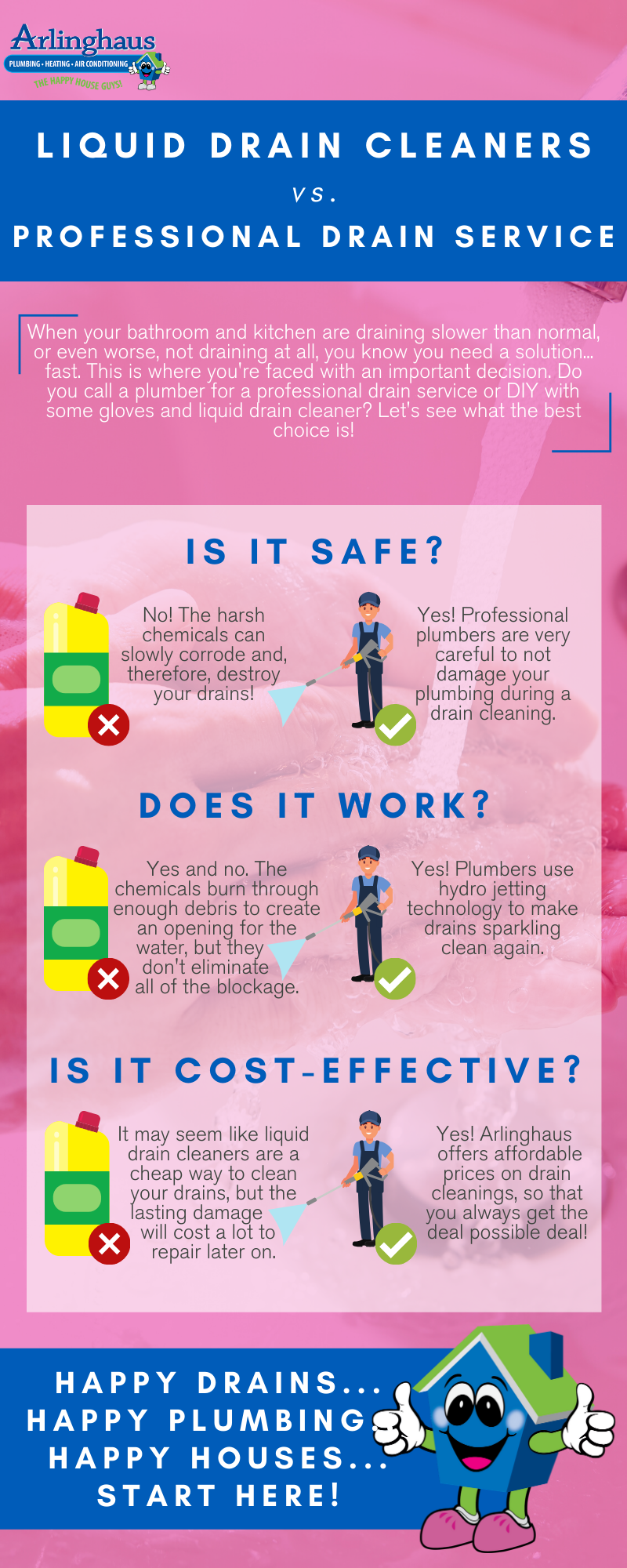Dealing with a clogged drain can be time-consuming, inconvenient, and downright frustrating! When homeowners in Cincinnati and nearby areas get fed up with their clogged drains, they usually turn to liquid drains. But do they really work? Are they safe to use? We explore everything you need to know about liquid drain cleaners in this blog.
How Does Drain Cleaner Work?
Your home’s pipes can become clogged with a bacteria buildup known as biofilm. This gunk, which forms on the walls of your pipes and drains, can pose several health risks. As biofilms consist of bacteria and organic waste, they can cause certain infections and diseases in humans.
But do liquid drain cleaners really work and get rid of this biofilm? Products like Drano and Liquid-Plumr only tackle the biofilm that they can reach. Thus, the drain cleaner will not be able to remove the biofilm deep within the drains.
You should never use liquid drain cleaner in laundry drains since drain cleaning solutions cannot break up the lint that primarily makes up the clogs in your laundry drains.
What Are Liquid Drain Cleaners Made of?
When asking if chemical drain cleaners work, it’s important to know exactly what’s in drain cleaner—specifically, what chemicals are in drain cleaner. There are two types of liquid drain cleaners: chemical cleaners and enzyme-based cleaners.
Most of the liquid drain cleaning products you’ll find on the shelf at your local supermarket are chemical cleaners. These are the bottles that are advertised as “quick and powerful solutions for the worst clogs!” They may seem like the best thing since residential plumbing, but they are actually quite dangerous. The active ingredients in chemical cleaners range from hydrochloric acid and sulfuric acid to lye and caustic soda. If you know anything about chemistry, you know that these components can be destructive if not handled properly. The bottom line is, chemical drains cleaners are not good to use.
So if chemical cleaners can be harmful, do enzyme drain cleaners work better?
Enzyme-based cleaners, on the other hand, are a gentler option for your drains. They use enzymes, or bacteria, to break down the organic matter in the pipes. These drain cleaners will not damage your plumbing, not to the extent that chemical cleaners do, but they work slowly. If you have a stubborn clog, don’t expect enzyme-based cleaners to show you any results at all.
As you can see, drain enzymes do work. However, they are certainly still not the strongest and most preferred way to clean your drains. Overall, a professional plumber will do a much better job than any cleaner you can purchase at a store.
Do Plumbers Recommend Using Liquid Drain Cleaners?
No, no, no!
If you’re thinking about purchasing a liquid drain cleaner, you probably have a sizable blockage that doesn’t let water drain well in your sink or bathtub. You’ll end up grabbing a chemical cleaner, so you can eliminate the clog quickly, as opposed to an enzyme-based cleaner, which is safer for your drain. What you don’t realize is that chemical cleaners cause more harm than good.
Chemical cleaners are filled with strong acids and bases that destroy basically everything they touch, from the hair that’s clogging your drains to the material of the pipe itself. With enough exposure to these strong chemicals, your drains will corrode and start leaking. You already know how dangerous leaks are! Plus, chemical cleaners don’t effectively eliminate the whole clog. They just burn a hole big enough to let more water than usual pass through. In the end, the blockage is very much still present, though it’s not as big as before, and your drains are damaged. Why take that chance when you can hire the best professional plumbers in Northern, KY, as well as Ohio and Indiana at an incredible price?
Adverse Effects of Chemical Drain Cleaners
Before you decide for yourself that chemical drain cleaners do work and that they’re worth the risk, let’s go over the other harmful effects chemical cleaners can have.
- Additional Repairs: While chemical drain cleaners do work to an extent, they can cause irreparable damage to your pipes. As a result, you could face expensive plumbing repairs.
- Septic Tank Issues: The bacteria in your septic tank is what breaks down and aids in the digestion of organic material in the tank. Chemical cleaners kill this necessary bacteria, essentially making your septic tank useless.
- Dangerous Fumes: Chemical cleaners’ harmful fumes can adversely affect your respiratory system, especially if you breathe the chemicals in for a long time.
- Irritating Effects: The strong stuff used in drain cleaners can irritate your eyes and skin. In serious cases, chemical cleaners can result in blindness and severe burns.
- Toxic to the Environment: If chemical cleaners seep into soil or groundwater, they can be incredibly harmful to wildlife, plants, and people who use the contaminated water.
Alternate Ways to Clean Your Drains
As it’s the easiest option, drain cleaner is what homeowners may reach for first. However, since chemical drain cleaners don’t work as well as some people believe, there are other ways to clean your drains of clogs effectively. These methods include:
- Using a Drain Snake: A drain snake, also called an auger, can clear plumbing blockages.
- Plunging the Drain: A flange plunger can potentially loosen drain clogs. Once you break up the clog that’s in your drain, you may be able to clean out the clog altogether.
- Water or Gas-Powered Cleaners: These types of cleaners, such as pressurized water bladders, may be able to force out clogs.
- Contacting a Plumber: In most cases, calling a professional plumber is the best way to fix a clogged drain once and for all.
Avoid Liquid Drain Cleaners and Contact a Plumber
In the end, chemical drain cleaners do not work with your drains—they work against them.
If your clogged drain is out of control, skip the liquid drain cleaner and call one of our best emergency plumbers in Cincinnati or the surrounding areas for help! We also offer expert drain cleaning services to safely and thoroughly remove stubborn blockages. We’ll have your drains smooth and sparkling in no time at all.
Want to learn more about keeping your plumbing running smoothly? Check out our guide to main drain cleanouts.



